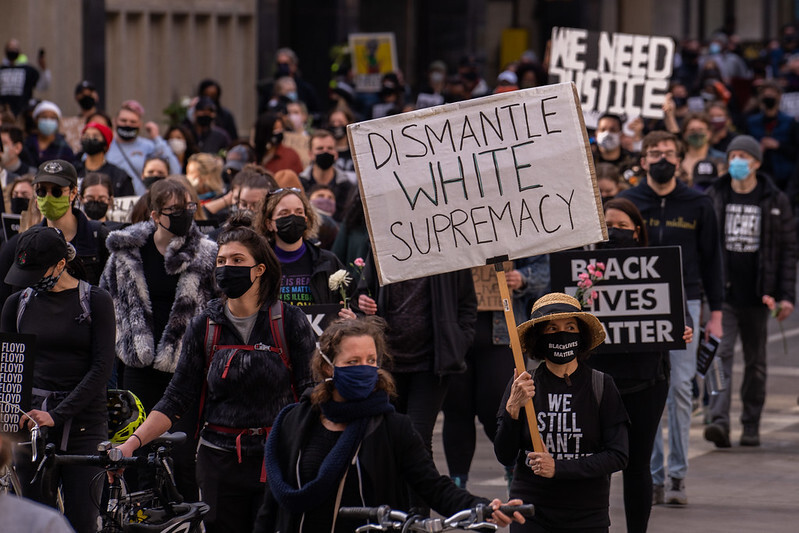WASHINGTON – Breaking down the rise in domestic terrorism, specifcally against minority populations — and debates over whether Democratic lawmakers support defunding the police — took center stage at a House hearing Thursday.
“That is the cruciality of this hearing,” said Chairwoman Sheila Jackson Lee (D-Texas). “That is the topic that should not be diminished. People die.”
At the root of the hearing was how radicalism, white supremacy and other forms of extremism threaten America’s national security and wellbeing.
“We have seen time and time again that people die because of white supremacy, because of hate and extremism in this country,” said Margaret Huang, president and CEO of the Southern Poverty Law Center, a nonprofit advocacy organization. Throughout the hearing, Huang reiterated the need to address the issue of white supremacy in America to successfully address the larger issue of domestic terrorism.
Subcommittee members touched on the communities most recently victims of such “anti” and “-ist” attacks, including the Black, Asian American, Jewish American and Latin American populations. President of Morgan State University, David K. Wilson, discussed the psychological and emotional damage recurring bomb threats to MSU and more than 20 other HBCU institutions have had on Black students.
“This is not 1865, it is not 1920, it is not 1962,” said Wilson. “This is 2022. But these domestic acts of terror persists across HBCUs.”
Rabbi Charlie Cytron-Walker, who was held hostage during January’s Texas synagogue attack, also spoke, emphasizing that threats can result in physical violence.
“Our words matter,” the rabbi said. “The more people get exposure to that negativity, the more people can pass it on.”
Domestic extremism has spiked in recent years.
“2019 was the deadliest year for domestic extremist violence since the Oklahoma City bombing in 1995,” FBI Director Christopher Wray told the House Homeland Security Committee during a 2020 appearance.
In 2020, law enforcement agencies submitted incident reports, 8,263 of which were criminal, and 11,129 related offenses related to bias. Nearly 62% were due to race, ethnicity or ancestry bias, while a little over 13% were due to religious bias.
“A threat today can become devastation tomorrow,” said Jackson Lee, explaining that in recent attacks against minorities, the perpetrators had shown prior evidence of racism and xenophobia against such individuals.
With the surge in domestic terrorist plots and attacks, the government needs to do a better job collecting federal data, as well as better equipping local officials to identify and respond to attacks, according Seth G. Jones, senior vice president and Harold Brown chair for the Center for Strategic and International Studies.
“The next target could be your family, your house of worship or your neighborhood,” said Rep. Jerrold Nadler (D-N.Y.), who chairs the House Judiciary Committee. “Domestic terrorism invades our safe spaces and makes us feel like strangers in our own country.”
The threats against minority populations and ways to protect them also raised questions about the intersection of funding for law enforcement and the rise in violence against minority communities and individuals.
“When you defend the police and enact policies to embolden criminals, it often is the minority communities that pay the most egregious price,” said ranking member Andy Biggs (R-Ariz.). “Despite the rises in crime, some on this committee, some of my colleagues across the aisle continue to push efforts to fund the police.”
Debating Defunding
Republicans focused on general crime, community violence and accused Democrats on the committee of supporting efforts to defund the police, a claim rejected by the Democratic lawmakers..
“I’m saddened that in every one of their questions, [the subcommittee’s Republican members] wanted to focus on crime in general,” said Rep. Karen Bass (D-Calif.). Bass said the hearing intended to address “radical extremism” and its continued existence in our society.
“Let me say it for about the millionth time. We are not going to defund the police,” added Rep. Val Demings (D-Fla.).
At one point, Rep. Steve Cohen (D-Tenn.) asked Biggs to name which Democratic members had explicitly said “defund the police,” to which the ranking member later responded: “That’s your best defense, Mr. Cohen?”
Members of both parties maintained that defunding the police wouldn’t be beneficial, particularly amid a rise in anti-police and law enforcement sentiment as well.
“Your acceptance and insight of the importance of this is crucial, because that’s the only way we can move forward in a bipartisan way,” Chairwoman Jackson Lee said.


